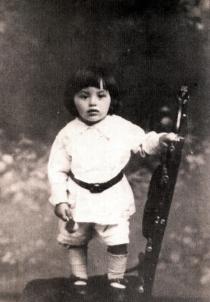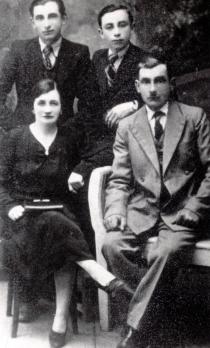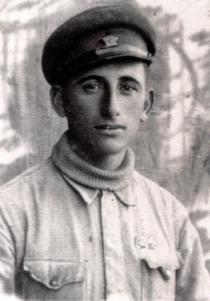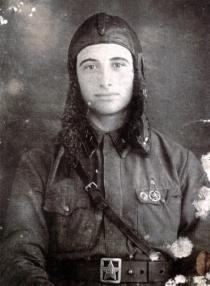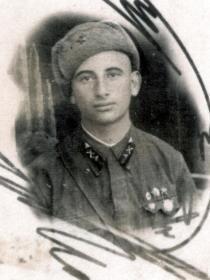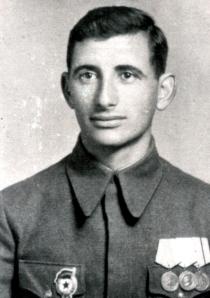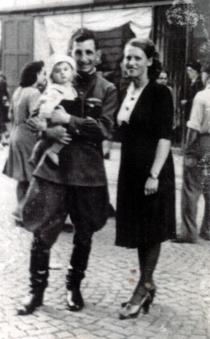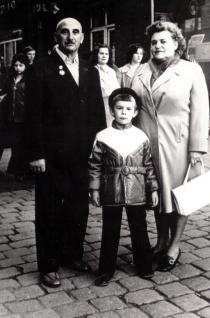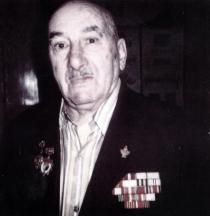My family. From left to right, sitting: my mother Golda Finkel, nee Mishulis, my father David Finkel. Standing: I, Efim Finkel (on the left) and my brother Boris Finkel (on the right). The photo was made in Razdelnaya Odessa region, 1934.
My parents knew each other since childhood. They were neighbors. My father proposed to my mother in 1916 when he turned 20. He was a blacksmith at that time and could provide for the family. My parents got married in 1917. Their families were religious and my parents had a traditional Jewish wedding.
After the wedding my parents lived with my mother's parents. Both families gave them some money as a wedding gift and my father bought a small shabby house for this money. My father and his brothers removed this house and built a new one from rock shell. My parents moved to their new house before I was born. I was born on 18 February 1920. My brother Boris, called Boria, was born in 1922. His Jewish name is Borukh.
We lived in our house until the war. There were 3 rooms and a kitchen in the house. My parents had a bedroom and my brother and I shared one room. One room served as a living room where the family got together to celebrate Sabbath and Jewish holidays. This was the biggest room. We had only the most necessary furniture in the house: a table, chairs, wardrobes and cupboards and steel beds. The only books we had were my father's religious ones. There was a stove to heat the rooms. Winters in Odessa are mild and rock shell kept the warmth in the house. There was a well and a shed in the backyard. My mother had flowers planted around the house. My parents didn't have a kitchen garden or livestock. Razdelnaya was a big village and farmers grew everything necessary that was sold at quite affordable prices at the market. There also was a big market in the neighboring village of Limanskoye. There was fish sold there and my mother always bought fish for Sabbath or other Jewish holidays. There was a shochet in the village and my mother had chickens slaughtered by him.
I remember the period of struggle against religion, but that didn't make our parents atheists. They went to the synagogue on Jewish holidays. They didn't always celebrate Shabbath since Saturday was a working day during the Soviet period and there were no exceptions for Jews. Sometimes our father had to stay longer at work on Friday and we waited for him to return to begin celebrating Shabbath. My mother bought challha bread for Saturday at a Jewish bakery. On Friday morning she started making food to last for two days. On Friday evening mother covered the table with a white tablecloth. There was challah bread and a silver saltcellar on the table. My mother put on a fancy dress and a shawl. We said a prayer in Yiddish. Mother lit candles and we prayed for health and wealth of our relatives. On death anniversary of our relatives we also said a remembrance prayer. After the prayer we pronounced ‘Shabbath Shalom!’ dipped a piece of challah in salt and ate it. Then we took to a festive dinner. My father was always so busy that he couldn’t afford time to teach us.
In 1935 I finished lower secondary school - 7 years. I went to a mechanic school after finishing secondary school. I had a technical mind and wanted to continue my studies. We studied general subjects like in secondary schools and had professional training. We were trained to operate and repair tractors and combine units. I liked what we were doing. I finished mechanic school in 1938 with honors for successes in my study and was sent to a higher mechanic school in Teplitsa village in about 30 kms from Razdelnaya where I was to study for 3 years and could come home on vacations and holidays.
My brother studied at the trade school of Odessa mechanic plant after finishing lower secondary school. He lived in a hostel for free since it belonged to the plant in Odessa and was planning to come home for vacation when the Great Patriotic War began.

